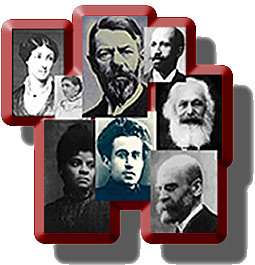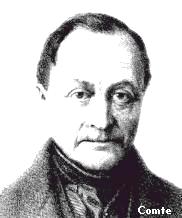
 |
 These are pictures on the left are pictures of some famous Sociologists, Social Scientists, and Political Scientists who have contributed a great deal to the field of Sociology with their research studies, theories, and research methods. Because of scientists such as Comte and Durkheim Sociology has been able to advance and evolve as a separate field in the Social Sciences. |
 |
 Undergraduate and graduate education and research in the School of Social Sciences at UCI represents a commitment to modern social science. The classic subject areas of anthropology, economics, linguistics, political science, philosophy of science, psychology, and sociology are included in the School's education programs, but these programs go well beyond traditional disciplines and can be characterized by the following emphases:
The School has by far the largest number of students of any academic unit on the UCI campus. At the same time, it has an extremely distinguished faculty which include members of the American Academy of Arts and Sciences and the National Academy of Sciences |
  |
Auguste Comte was born on January 19, 1798, on the first of Pluviose in the Sixth Year of the Republic, in the southern French city of Montpellier. His father, a fervent Catholic and discreet Royalist, was a petty government official, an earnest, methodical, and straightlaced man, devoted to his work, his religion, and his family, whose only pastime was to cultivate his garden. The older Comte despised the Revolution and decried the persecution of Catholicism it had brought in its wake but never forgot that he was in the service of the government, no matter how quickly its form and composition changed in these turbulent times. He was, above all, a man attached to order. Small, delicate, and subject to many illnesses, the young Auguste Comte nevertheless proved to be an outstanding student at the imperial lycee of his native town, which he had entered at the age of nine. He was studiously devoted to his work, but he was also among the most recalcitrant and rebellious of the students. Very early in his school career he lost the faith of his parents and substituted for it a fervent republican faith in liberty. He hated the reigning Emperor and dreamed of a revival of the glorious days of the Revolution. The French philosopher and social theorist Auguste Comte is known as the originator of sociology and `positivism', a philosophical system by which he aimed to discover and perfect the proper political arrangements of modern industrial society. He was the first thinker to advocate the use of scientific procedures in the study of economics, politics and social behaviour, and, motivated by the social and moral problems caused by the French Revolution, he held that the practice of such a science would lead inevitably to social regeneration and progress. Comte's positivism can be characterized as an approach which rejects as illegitimate all that cannot be directly observed in the investigation and study of any subject. His system of `positive philosophy' had two laws at its foundation: a historical or logical law, `the law of three stages', and an epistemological law, the classification or hierarchy of the sciences. The law of three stages governs the development of human intelligence and society: in the first stage, early societies base their knowledge on theological grounds, giving ultimately divine explanations for all phenomena; later, in the metaphysical stage, forces and essences are sought as explanations, but these are equally chimerical and untestable; finally, in the positive or scientific stage, knowledge is secured solely on observations, by their correlation and sequence. Comte saw this process occurring not only in European society, but also in the lives of every individual. We seek theological solutions in childhood, metaphysical solutions in youth, and scientific explanations in adulthood. His second, epistemological law fixed a classification or hierarchy of sciences according to their arrival at the positive stage of knowledge. In order of historical development and thus of increasing complexity, these are mathematics, astronomy, physics, chemistry, biology and sociology. (Comte rejected psychology as a science, on the grounds that its data were unobservable and therefore untestable.) Knowledge of one science rested partly on the findings of the preceding science; for Comte, students must progress through the sciences in the correct order, using the simpler and more precise methods of the preceding science to tackle the more complex issues of later ones. In his sixvolume Cours de philosophie positive (The Positive Philosophy) (1830-42), Comte gave an encyclopedic account of these sciences, ending with an exposition of what he regarded as the most advanced: social physics or 'sociology' (a term he invented). The sociologist's job would be to discover the laws that govern human behaviour on a large scale, and the ways in which social institutions and norms operate together in a complex yet ultimately predictable system. In his later work, Comte fleshed out his vision of the positive society, describing among other things a Religion of Humanity in which historical figures would be worshipped according to their contribution to society. Despite such extravagances, however, the broader themes of his positivism -- especially the idea that longstanding social problems should be approached scientifically - proved influential both in France and, through J.S. Mill's early support, in England.
|
 |
 Emile Durkheim 1858 - 1917 Emile D. Durkheim was born on the evening of April 15, 1858 at Epinal, in Lorraine. His mother, Melanie, was a merchant's daughter and his father was the Rabbi of Epinal and was also Chief Rabbi of the Vosges and Haute-Marne. Emile spent part of his early school years in a rabbinical school, destined to follow the footsteps of his father, grandfather and great grandfather, who had also been rabbis. However, this desire was short-lived as he cut away from Judaism after he arrived in Paris. Emile Durkheim is by far one of the most important and prolific sociologists in the history of the field. Durkheim himself is credited with making sociology a science, as he used an empirical methodology in his own studies, especially in regard to his study of suicide rates and issues of European nations. Durkheim coined the term "anomie," and shed light on the inner workings of society that his predecessors had overlooked. He showed that all the aspects of human society work together much like the parts of a machine, and this concept is referred to today as sociological functionalism. This idea of functionalism--societal organization playing the major role in the lives of humans--has become the very paradigm of most sociological study today. Durkheim possessed a razor-sharp intellect and he excelled at the "College dEpinal", acquiring his baccalaureates in Letters and Sciences. He also made a name for himself with his outstanding performance in the Concours General. He left Epinal for Paris to prepare for admission into the Ecole Normale Superieur, but the emotional distress caused by his fathers illness affected his studies. Finally, in 1879 he passed the entrance examinations after his third attempt and was admitted at the age of 21. At the Ecole, Durkheim met and became friends with Charles Renouvier and Emile Boutoux, both philosophers. He also became friends with Numas-Denis Fustel de Coulanges, who was a historian. He successfully passed his tests, which was the most competitive examination required for admission to the teaching staff of state secondary schools, and started to teach philosophy in 1882. In 1887, Durkheim was appointed "charged un cours de science sociale et de pedagoie" at Bordeaux. Not everyone was pleased by his appointment because he was a Social Scientist and the Faculty of Letters at Bordeaux was predominately humanist. Throughout this Bordeaux period, Durkheim emphasized the value of sociology and also lectured on the theory, history and practice of education. He taught social science devoting his time on specialized studies like kinship, crime, law, religion, incest and socialism. In 1896, Durkheim put aside his work on the history of socialism and put all his efforts into establishing a massive program of journalistic collaboration. In 1898, he founded the "Annee Sociologique," the first Social Science Journal in France. It was supported by extremely intelligent young scholars and they provided an annual survey of sociological literature. In 1902, Durkheim was made a Professor. Emile Durkheim returned to Paris with a reputation as a powerful force in Sociology and Education. His ideas of the "science of morality" antagonized the Catholics and his subsequent appointment to the Forborne angered those on the political right. Durkehiems new appointment gave him a great deal of power. All students going for a degree in Philosophy, Languages, History or Literature were required to take his courses. Tragedy struck Durkheim as his son Andre, a brilliant linguist, was killed at the Bulgarian front in the war between Germany and Belgium. He was declared dead in April 1916. This was a terrible blow to Durkheim from which he never fully recovered. He suffered a stroke and died a year later on November 15, 1917. He was 59 years old. He is considered to be one of the most influential men in the evolution of sociology. |
My research interest is in Interdisciplinary research in Chicano/Latino Studies. Interdisciplinary research in Chicano/Latino Studies is conducted under the auspices of the center for research on Latinos in a global society (CRLGS). Its multifold goals are: (1) to examine the emerging role of Latinos as actors in global economic, political, and cultural events; (2) to promote Latino scholarship; (3) to enhance the quality of research in Latino studies; (4) to provide a forum for intellectual exchange and the dissemination of research findings; and (5) to promote the participation of undergraduate and graduate students in research on Latino issues. The use of the term "global society" underscores the faculty's perception that, as a society, the United States is becoming "globalized," meaning that is is increasingly affected by worldwide economic, political, demographic, and cultural forces and that Latinos are at the center of this. Latinos in the United States, individually and as a socio-political group, play important roles in the multiple processes–––immigration, trade, international capital flow, and international political movements–––which are changing the traditional demarcation between domestic and foreign, and national and international politics, economics and society.
It is anticipated that research conducted by
participating faculty and other scholars will help guide policy-makers
in their decisions regarding societies which are experiencing a growing
Latino presence. One example of this growing diversity is, of course,
the State of California, which has become ethnically and linguistically
more diverse than many world nations–––more than 100 languages are
spoken in the public schools of Southern California alone. This
research will contribute to the understanding of cultural, social, and
political dimensions of demographic change such as that experienced by
California. Although the research will focus on the population of
Latinos within California and the U.S., it will do so within the
context of the United States in a global society.